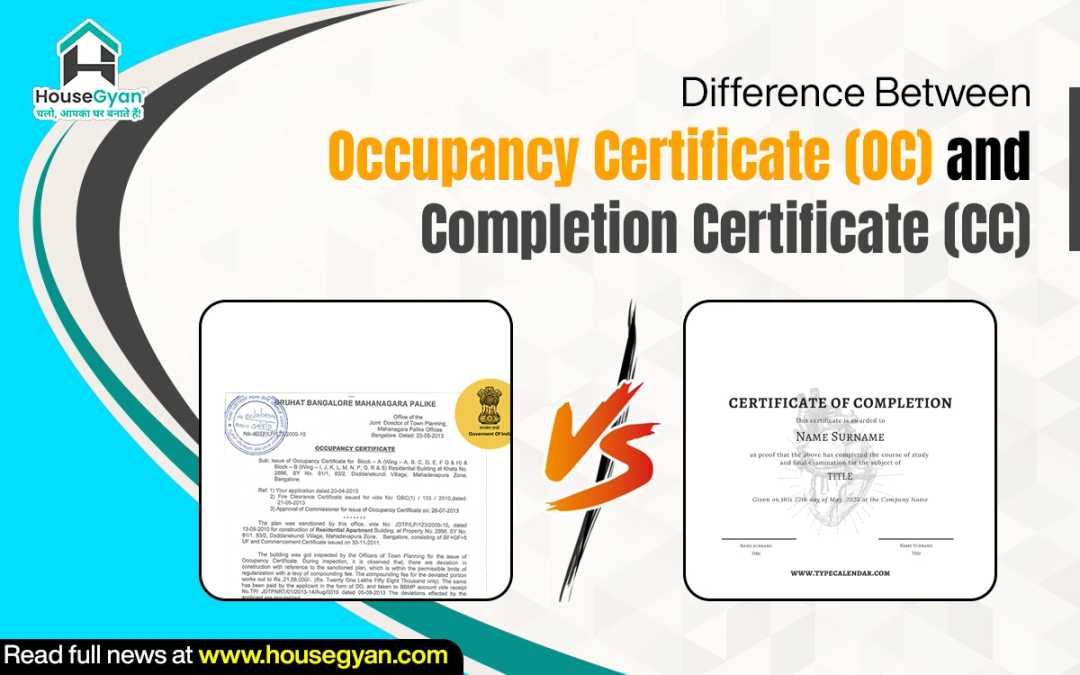
3rd, May, 2025
Difference Between Occupancy Certificate (OC) and Completion Certificate (CC)
When building or buying a new home, there are many important documents involved. Two of the most crucial ones are the Occupancy Certificate (OC) and the Completion Certificate (CC). These documents are often misunderstood, but they play a key role in making your home legal, safe, and ready to live in. In this article, I’ll explain in simple words what these certificates mean, how they differ, why they are important, and how they affect your house plan and property. A Completion Certificate (CC) is a legal document issued by the local municipal authority. It confirms that the construction of the building is complete and has been done according to the approved house plan, building standards, and local rules. Key Points About Completion Certificate: It is issued after the construction is fully completed. It confirms that the building follows: Approved building house plan Local by laws and regulations Safety norms It is necessary to apply for an Occupancy Certificate. Without a CC, the building is considered “unauthorised construction”. Why is CC Important? It ensures that the building is legally constructed. Helps in getting utility connections like electricity and water. Important for future property resale or loan approval. An Occupancy Certificate (OC) is a legal document that proves a building is safe to live in. It is issued by the local authority after verifying that the building is complete and meets all required living conditions. Key Points About Occupancy Certificate: It is issued after the Completion Certificate. It confirms that: The building is ready for occupancy. Basic amenities (water, electricity, fire safety, sewage) are available. OC is required for the legal possession and occupation of a flat or house. Why is OC Important? It is necessary for legally moving into the property. It is needed to get the home loan disbursement (final instalment). Required for property registration in some states. Without OC, your stay in the house may be considered illegal. Without CC: The construction itself is considered illegal. This can lead to penalties or demolition. Without OC: You are not legally allowed to live in the house. You may face trouble in getting utilities, loans, or resale. So, always ask for OC and CC before buying a flat or moving into a newly constructed house. When your house plan is approved by the local authorities, it becomes a blueprint that must be followed during construction. The CC ensures your building follows the approved plan, and the OC ensures it is safe and fit for living. If there are changes made during construction that don’t match the approved plan, you may face issues in getting the CC or OC. That’s why it’s very important to: Get your house plan approved before starting construction. Stick to the approved plan without major changes. Complete all necessary safety checks and utility installations. Documents Needed: Approved house plan Commencement certificate (proof that building started legally) Completion affidavit by the architect or engineer Photographs of the building NOC from the fire and pollution departments Tax paid receipts Layout and elevation of the property Time Taken: After applying, the local authority takes 15 to 30 days to verify and issue OC and CC, if everything is in order. Q1: Who applies for OC and CC? The builder or developer usually applies for both. In case of individual homes, the owner may have to apply. Q2: Can I sell my property without OC? Technically, yes but it may reduce the value of your property and can create legal issues. Q3: Is OC needed for registration? In many states, yes. Some states have made OC mandatory for registering a flat. Q4: Can I get a home loan without OC or CC? Banks usually ask for both CC and OC, especially before releasing the final loan instalment. Whether you're building a home or buying one, always make sure the builder has obtained both the Completion Certificate (CC) and Occupancy Certificate (OC). These documents protect your investment, ensure your house is safe and legal, and give you peace of mind. Also, always start with a proper house plan approved by the authorities. That one step ensures a smoother process in getting all other certificates and approvals later.What is a Completion Certificate (CC)?
What is an Occupancy Certificate (OC)?
OC vs CC: What’s the Difference?
Can You Live in a House Without an OC or CC?
How Does This Relate to Your House Plan?
How to Get OC and CC?
FAQs About OC and CC
Conclusion
House Gyan all services
Loading...HouseGyan is your trusted platform for everything related to home design, construction, and planning. We offer a complete range of services to help you build your dream home with ease and confidence.
Our Services
- Price Calculators: Plan your budget with our tools like Home Loan EMI Calculator, Tile Price Calculator, Brick Cost Calculator, and more.
- House Drawings & Plans: Explore ready-made house plans or get custom house drawings designed to fit your needs perfectly.
- Elevation Designs: Choose from modern elevation designs or request a custom elevation design for a unique look.
- Accurate Estimates: Get clear and accurate construction cost estimates to plan better.
- Shubh Muhurat & Vastu Tips: Follow our Shubh Muhurat and Vastu guidelines to bring positive energy and harmony to your home.
- DIY Home Repair Guides: Learn easy DIY tips to fix and maintain your home efficiently.
- Interior Design Ideas: Discover creative ideas for living rooms, bedrooms, kitchens, balconies, and more.
Why Choose HouseGyan?
- All-in-One Platform: From house plans to price calculators, we cover it all.
- Custom Solutions: Get personalized designs and estimates for your home.
- Expert Guidance: Access professional tips on Vastu, Shubh Muhurat, and construction materials.
- User-Friendly: Our tools and content are designed to simplify home building for everyone.

The information contained on Housegyan.com is provided for general informational purposes only. While we strive to ensure that the content on our website is accurate and current, we make no warranties or representations of any kind, express or implied, about the completeness, accuracy, reliability, suitability, or availability with respect to the website or the information, products, services, or related graphics contained on the website for any purpose. Housegyan.com will not be liable for any loss or damage including, without limitation, indirect or consequential loss or damage, or any loss or damage whatsoever arising from loss of data or profits arising out of, or in connection with, the use of this website.
Third party logos and marks are registered trademarks of their respective owners. All rights reserved.










